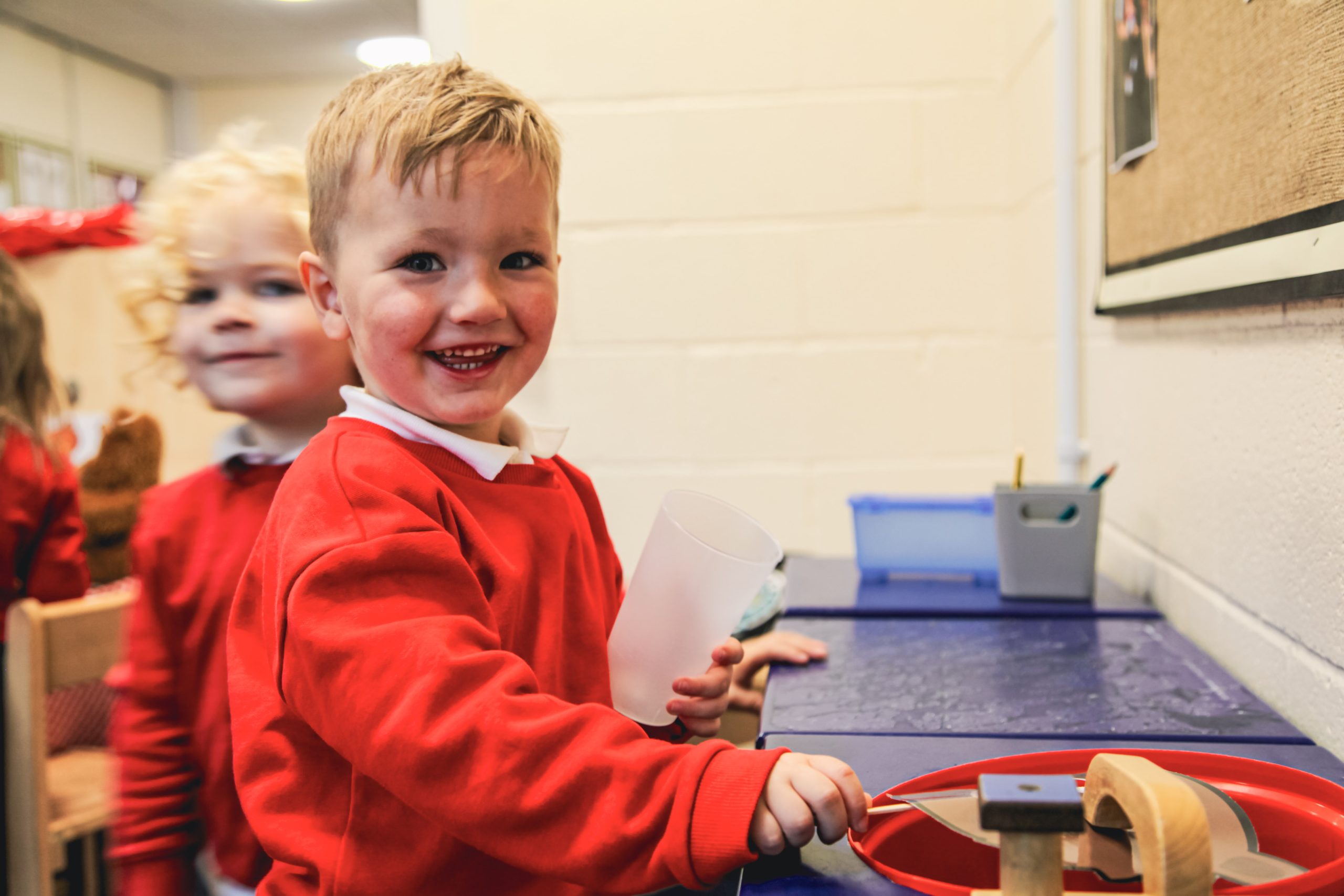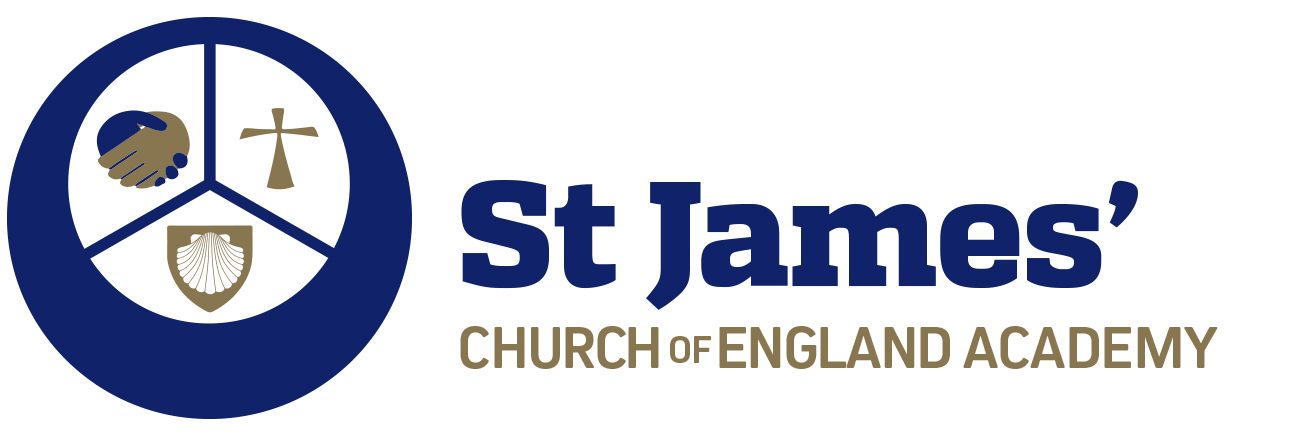EYFS
At St. James’ we believe that the Early Years of a child’s life are the most important as a foundation for a child to grow and develop into a healthy, happy, confident and independent person. We want children to feel cared for, develop a love of learning and to strive to be the best that they can be.
The following statement taken from the Early Years Statutory Framework summarises the importance of the Early Years and why we strive for excellence in our early years setting.
‘Every child deserves the best possible start in life and the support that enables them to fulfil their potential. Children develop quickly in the early years and a child’s experiences between birth and age five have a major impact on their future life chances. A secure, safe and happy childhood is important in its own right. Good parenting and high quality early learning together provide the foundation children need to make the most of their abilities and talents as they grow up.’
Intent (What we do)
Our Curriculum
Our Early Years curriculum is unique to St. James’, planned and developed around the specific needs of our children and our community and covers all aspects of the Early Years Foundation Stage Statutory Framework (see information below). Our curriculum is centered around the importance of developing pupils’ communication and language skills, whilst learning about the world in which we live.
Our core Christian values of ‘kindness, respect and perseverance’ also underpin everything we do. We encourage all children to show kindness and consideration to others, to be able to share, negotiate and work well as part of a team. We support pupils to develop a ‘can-do’ attitude, to believe in themselves and to not give up when facing challenges. Developing these skills by the end of Reception ensures that our pupils are prepared for KS1 and beyond, in order to achieve and exceed in life.
Our curriculum is based on topics which have a focus on ‘Understanding the World’ and we use stories and non-fiction books to support our teaching. There is a clear progression of knowledge and skills from Nursery through to Reception.
Link: Nursery Long-Term Plan 2024/25
Link: Reception Long-Term Plan 2024/25
We ensure that flexibility is built into our curriculum so that children’s own learning journeys can be supported and their individual talents, interests and needs are always nurtured.
This is underpinned by the Trust vision for Excellence in the Early Years.
The EYFS Statutory Framework:
- sets the standards that all early year’s providers must meet to ensure that children learn and develop well
- ensures children are kept healthy and safe
- ensures that children have the knowledge and skills they need to start school
The Characteristics of Effective Learning
The three characteristics of effective learning describe the behaviours children use in order to learn:
Playing and exploring – children investigate and experience things, and build the resilience to ‘have a go’
Active learning – children concentrate and keep on trying if they encounter difficulties, and enjoy achieving
Creating and thinking critically – children have and develop their own ideas, make links between ideas, and develop strategies for doing things
The Areas of Learning and Development
The three prime areas are particularly important for building a foundation for igniting children’s curiosity and enthusiasm for learning, forming relationships, and thriving, underpinning the specific areas of learning.
The Prime Areas
Communication and Language
Personal, social and Emotional Development
Physical Development
There are four specific areas through which the prime areas are strengthened and applied.
The Specific Areas
Literacy
Mathematics
Understanding the world
Expressive arts and design
Link: EYFS Statutory Framework
Learning to Read and Write in EYFS
Phonics is taught in Reception and Key Stage One through the Read Write Inc programme which is a systematic synthetic phonics programme and a highly effective approach used for the teaching of early reading and writing.
Link: Reading and Phonics
Our Nursery phonics teaching consists of developing children’s listening and attention skills and their phonological awareness. This is taught through daily phase 1 activities, incorporating the aspects of: environmental sounds, instrumental sounds, body percussion, voice sounds, rhyme and alliteration. Children listen to and join in with songs and rhymes, sound games and syllable clapping activities. This early stage of phonics supports children to develop the listening and attention skills and sound awareness, ready to begin the Read Write Inc programme. In the summer term prior to beginning the Reception year, our Nursery children play ‘Fred games’ from RWI which develops oral blending skills in preparation for learning the letter sounds.
Implementation (How we do what we do)
Our Learning Environment
At St. James’ we recognise that the environment plays a key role in supporting and extending children’s learning and development. The EYFS environment is organised to allow children to explore and learn securely and safely. Our setting is an early years unit which allows Nursery and Reception pupils to learn together during child initiated learning time. The setting is calm and well-organised, children are able to find and locate equipment and resources independently. Continuous provision is regularly enhanced with new learning opportunities and first-hand experiences which cater for children at different ages and stages of development. At various points during the day a door partitions the Nursery and Reception teaching areas, which allows for focused group work such as phonics and maths to take place. Our outdoor area enables children to explore, use their senses and be physically active. Reception pupils enjoy weekly forest school sessions, taking part in a variety of activities such as den building, tool work, communication games and activities, team work, role-play and learning about nature.
The Role of Adults
At St. James’ we have a skilled and dedicated team of staff in Early Years who genuinely care for the children in our setting. We strive to achieve excellence and improved outcomes for all pupils.
Our timetable is carefully planned to ensure that we maintain a careful balance between adult led and child initiated learning for all children. During child initiated time the adults take on various roles to support, extend and challenge the children in their learning. Some adults will teach specific skills within the areas of provision, planned based on the interests or needs of the children. Other adults work alongside children in their play, whilst sensitively questioning, modelling, developing children’s language and social skills and promoting independent thinking. We ensure that children develop positive characteristics of effective learning by encouraging children to persevere, be resilient, test their ideas and solve problems.
Positive Relationships
At St. James’ we are committed to developing and sustaining positive relationships with our families and working together to provide the best possible start to their children’s education.
We communicate with our parents in a variety of ways, first and foremost in person. Our Early Years staff are on the door to greet children and parents at the beginning of the day and to say goodbye at the end of the day. We also share other messages with parents about their child’s day and their achievements, and parents value this regular face-to-face communication. Reception parents receive termly reports and parent meetings to discuss their child’s progress and targets they are working towards. We use an online platform called ‘Tapestry’ as a communication tool with parents, through which we share photographs and observations of their child’s learning and whereby parents can also share observations and comments. Parents are updated regularly about school events and the curriculum through half termly class newsletters and occasional posts on Twitter. Furthermore, we hold a variety of meetings and workshops for parents about starting school, teaching and learning phonics and mathematics, ‘Reading on a Rug’ events and stay and play sessions.
Impact (The result of what we do)
The curriculum we have designed at St. James’ is personalised to ensure that language development is central to our work. As a result, children make rapid progress in communication and language which has a positive impact on pupils’ self-confidence, social skills and their ability to flourish in all other areas of the curriculum. Adults listen and respond to children, play with them and show a genuine interest in what they say and do. The impact of these positive relationships ensure that pupils feel valued and there is a mutual respect between adults and children. The careful balance between adult led and child initiated learning ensures that pupils achieve the necessary skills in reading, writing and maths whilst developing characteristics of effective learning through their play. As a result, children learn to be independent and think of their own ideas, whilst developing perseverance and resilience when things don’t go to plan. Our children understand the importance of kindness and will know that this begins with themselves and extends to friends, family, community and our world. Strong personal, social and emotional skills will enable them to engage fully in teamwork and through our teaching and modelling of respect, children learn to accept and appreciate the contribution of others. Our children will be fully prepared for their transition to Key Stage One. They have developed the personal, social and academic skills to become a successful learner and a love of learning that will help them reach their full potential.
Our Outcomes
At St. James’ we have high expectations of all children regardless of their backgrounds, experience or learning needs. We ensure that all pupils make good progress across all areas of learning and ongoing assessments identify pupils who may need more support to achieve this. Our curriculum and provision takes into account children’s interests and differing learning needs. Adult interaction and support is also differentiated according to pupils’ developmental stages. We support and empower children to believe in themselves and strive to be the best they can be.
Newsletters
Nursery Newsletter – Spring 2 2025
Reception Newsletter – Spring 2 2025
Nursery Newsletter – Spring 1 2025
Reception Newsletter – Spring 1 2025
Nursery Newsletter – Autumn 2 2024
Reception Newsletter – Autumn 2 2024
Nursery Newsletter – Autumn 1 2024
Reception Newsletter – Autumn 1 2024



